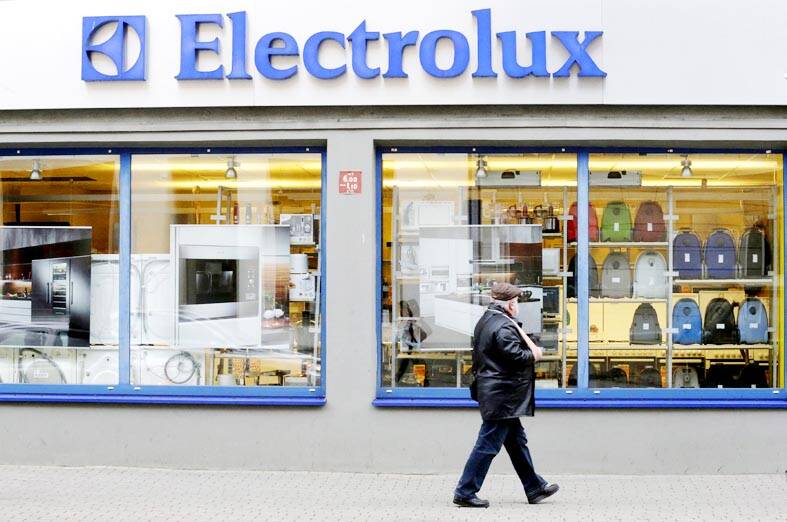Midea Group Co (美的集團) is exploring a potential acquisition of Electrolux AB, people familiar with the matter said, a bold move by the Chinese home appliance giant to add the higher-end luxury Swedish brand despite potential political opposition.
Midea made a preliminary approach in the past few weeks to the white-goods manufacturer about a possible transaction, said the people, who asked not to be identified because discussions are private.
Electrolux has so far not been receptive to the proposal, some of the people said.

Photo: Reuters
Midea has been interested in Electrolux for some time and would only want a friendly deal, the people said.
Other Asian appliance makers including Samsung Electronics Co have also looked at the Swedish business, they added.
Stockholm-based Electrolux’s B shares rose almost 16 percent on Friday on better-than-expected earnings, giving it a market capitalization of US$4.3 billion. Midea shares are up about 10 percent this year, valuing it about US$58 billion.
The deal would test the Chinese company’s ability to make foreign acquisitions amid growing protectionist measures in Europe and the US, even if dishwashers and refrigerators would not necessarily be deemed a national security risk.
Buying Electrolux would add to previous overseas acquisitions by Midea. The company, which is based in Guangdong Province’s Foshan, bought a controlling stake in Toshiba Corp’s home appliance unit in 2016. It acquired German robot maker Kuka AG a year later, which triggered concerns in the German government.
Midea chairman Paul Fang (方洪波) hinted at interest in acquisitions in the US and Europe in 2017 after the firm participated in the bidding for General Electric Co’s white goods unit, which was sold to Chinese competitor Haier Group (海爾集團). Turkey’s Arcelik AS, which completed a European deal with Whirlpool Corp this year, is also a competitor.
Midea and Electrolux already have some partnerships, and in 2018 they launched the high-end AEG brand in China.
A spokesperson for Electrolux declined to comment, while representatives for Midea and Samsung could not be immediately reached for comment outside usual business hours.
Key to any deal would be getting the support from the billionaire Wallenberg family’s Investor AB, the biggest shareholder in Electrolux. There was speculation in February about Midea’s potential interest.
Electrolux is laying off 3,800 workers as it seeks to cut costs and turn around its North American business. It reported first-quarter earnings that were better than expected overall, but still showed a net loss, with analysts pointing to negative cash flow.
Midea’s net income in the first quarter increased 12 percent year-on-year to 8 billion yuan (US$1.16 billion), the company said on Friday.
It also reported net income of 29.6 billion yuan last year, missing analyst estimates.

SEMICONDUCTORS: The German laser and plasma generator company will expand its local services as its specialized offerings support Taiwan’s semiconductor industries Trumpf SE + Co KG, a global leader in supplying laser technology and plasma generators used in chip production, is expanding its investments in Taiwan in an effort to deeply integrate into the global semiconductor supply chain in the pursuit of growth. The company, headquartered in Ditzingen, Germany, has invested significantly in a newly inaugurated regional technical center for plasma generators in Taoyuan, its latest expansion in Taiwan after being engaged in various industries for more than 25 years. The center, the first of its kind Trumpf built outside Germany, aims to serve customers from Taiwan, Japan, Southeast Asia and South Korea,

Gasoline and diesel prices at domestic fuel stations are to fall NT$0.2 per liter this week, down for a second consecutive week, CPC Corp, Taiwan (台灣中油) and Formosa Petrochemical Corp (台塑石化) announced yesterday. Effective today, gasoline prices at CPC and Formosa stations are to drop to NT$26.4, NT$27.9 and NT$29.9 per liter for 92, 95 and 98-octane unleaded gasoline respectively, the companies said in separate statements. The price of premium diesel is to fall to NT$24.8 per liter at CPC stations and NT$24.6 at Formosa pumps, they said. The price adjustments came even as international crude oil prices rose last week, as traders

Taiwan Semiconductor Manufacturing Co (TSMC, 台積電), which supplies advanced chips to Nvidia Corp and Apple Inc, yesterday reported NT$1.046 trillion (US$33.1 billion) in revenue for last quarter, driven by constantly strong demand for artificial intelligence (AI) chips, falling in the upper end of its forecast. Based on TSMC’s financial guidance, revenue would expand about 22 percent sequentially to the range from US$32.2 billion to US$33.4 billion during the final quarter of 2024, it told investors in October last year. Last year in total, revenue jumped 31.61 percent to NT$3.81 trillion, compared with NT$2.89 trillion generated in the year before, according to

PRECEDENTED TIMES: In news that surely does not shock, AI and tech exports drove a banner for exports last year as Taiwan’s economic growth experienced a flood tide Taiwan’s exports delivered a blockbuster finish to last year with last month’s shipments rising at the second-highest pace on record as demand for artificial intelligence (AI) hardware and advanced computing remained strong, the Ministry of Finance said yesterday. Exports surged 43.4 percent from a year earlier to US$62.48 billion last month, extending growth to 26 consecutive months. Imports climbed 14.9 percent to US$43.04 billion, the second-highest monthly level historically, resulting in a trade surplus of US$19.43 billion — more than double that of the year before. Department of Statistics Director-General Beatrice Tsai (蔡美娜) described the performance as “surprisingly outstanding,” forecasting export growth